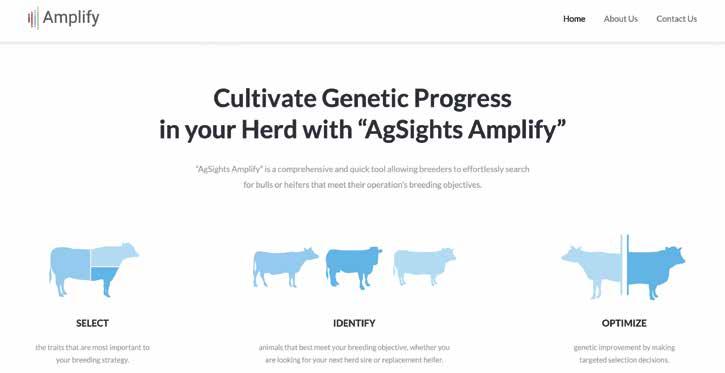
3 minute read
AgSights Update
Should I Stay or Should I Go
By Jasper Munro, AgSights Manager of Research and Innovation jmunro@agsisghts.com • www.agsights.com
For many of us, August means the calf crop is off and running, breeding season is wrapping up and the cows are pregnant… hopefully. A dry July impacted forage yields across the province and may already be pulling on stored feed inventories. Meanwhile, the impact of COVID-19 continues, with expected uncertainty in fall stocker and cull cow markets. Weather and the economy – both are factors that are all too familiar when it comes to selection decisions. So, how do we determine who stays and who goes? A common topic that is often overlooked and undervalued.
Countless resources on making these ‘selection decisions’ are available. Resources cover the three main factors in a selection decision: available resources (feed, bedding, bunk space), the market (stocker price, retail market) and the breeding objective – the traits (birth weight, weaning weight) and their importance for the target market. Most operations have a good handle on their available winter feed stores, building capacity, bedding, etc. Next is determining our market. Are we selling weaned calves, short-yearlings or selling direct to market? Finally, we need to determine important traits for our market and identify superior animals.
This is where the challenge begins. Across the industry there are countless traits and tools that can be used for selecting animals. A robust and efficient approach is estimated progeny differences (EPDs) – a method estimating the genetic merit of an animal using its own, pedigree and progeny records. To make a refined selection decision, the relative importance of each EPD must be considered. Multiple EPDs must be considered, often complicating our understanding and limiting EPD use. In more recent years, breed associations have rolled out selection indexes. An approach that combines multiple EPDs, and their importance (weighting) in the predefined breeding objective, into one value. For some, selection indexes simplify animal selection but limit our ability to set and implement our breeding objective. The need for a simple but dynamic approach to animal selection is clear.
Since 1993, AgSights has offered across-breed EPDs, coined acrossbreed comparisons (ABCs), and selection indexes ($BIO) through services, tools and reports that have seen diminished use. Client feedback and industry input was clear, we needed to re-evaluate our approach to animal selection. Earlier this year we began designing and building a simple, customizable animal selection tool called AgSights Amplify.
AgSights Amplify will be accessible by all (including non-AgSights members) through our website (www.agsights.com), enabling all beef farmers to simplify and optimize their selection decisions. There are just two steps: select your basic animal requirements (sex, breed, location) and then select the traits (ABCs) and their importance to your breeding objective. Once the Amplify tool considers correlated traits and indirect selection, the information is used to create your custom selection index. Amplify will search the AgSights database and display birth, pedigree, performance and ABC information on the top animals that meet your breeding objective – animals with the highest custom selection index. Users of Go360|bioTrack or AgSights Bull and Heifer Evaluations will be able to easily select replacement heifers and bull test candidates, identify potential herd sires and compare mature cows. Any breeder, farmer or rancher will have access to Amplify to enter their criteria and identify potential heifers or bulls for sale that meet their needs.
The design and development of AgSights Amplify is underway and we are anticipating its release in time for bull and heifer evaluations this fall. The success and usefulness of the program will depend on your input. As a member cooperative, our products and services are only successful if they create value for our members. Feedback following initial release will ensure that Amplify continues to improve, helping operations simplify selection decisions and amplify their herd’s genetic improvement.











